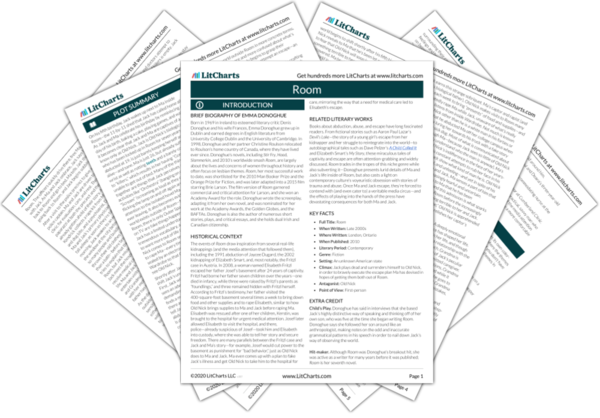Emma Donoghue uses teeth throughout Room to symbolize the various ways that Ma and Jack experience both their individual identities and their shared relationship. The character most obsessed with teeth is Ma, whose years of depression early on in her captivity led her to neglect her personal and oral hygiene. At the start of the novel, Jack describes Ma’s teeth as “rotted.” She is forced to take painkillers daily to numb the intense pain her teeth cause her, and at one point, she even loses Bad Tooth—the tooth that has been giving her the most trouble for the longest time. Ma neglected her oral hygiene for so long because she didn’t care whether she lived or died—now that she has Jack, though, she has started to take care of her teeth, and makes sure that Jack brushes his teeth diligently twice a day (even though he and Ma must share one single toothbrush). Jack—whose teeth are “dazzling” thanks to Ma’s attentiveness—soon adopts Ma’s lost Bad Tooth as a totem of sorts, carrying it with him in his socks and even in his cheek as he and Ma execute their escape plan and venture out of Room. The world is scary for Jack, and in carrying Bad Tooth around, he believes he can feel (and even taste) Ma at any time. The more Jack sucks on Bad Tooth, though, the less it reminds him of Ma, and the more it seems to represent nothing at all, not even comfort. At the end of the novel, Jack loses Bad Tooth and becomes upset, but Ma urges him not to worry too much about it—it’ll either turn up, or it won’t. For both Jack and Ma, teeth represented everything at the start of the novel: they were one of the very few ways they could attempt to control their identities and their circumstances within Room. By the end of the novel, however, Jack and Ma are more whole, independent people, and are less reliant on superficial factors like teeth to shape their identities and their bond.
Teeth Quotes in Room
“Listen. What we see on TV is... it’s pictures of real things.”
That’s the most astonishing I ever heard.
Ma’s got her hand over her mouth.
“Dora’s real for real?”
She takes her hand away. “No, sorry. Lots of TV is made-up pictures—like, Dora’s just a drawing—but the other people, the ones with faces that look like you and me, they’re real.”
“Actual humans?”
She nods. “And the places are real too, like farms and forests and airplanes and cities. . . ”
“Nah.” Why is she tricking me? “Where would they fit?”
“I don’t think you appreciate how good you’ve got it here,” says Old Nick. […] “Aboveground, natural light, central air, it’s a cut above some places, I can tell you. Fresh fruit, toiletries, what have you, click your fingers and it’s there. Plenty girls would thank their lucky stars for a setup like this, safe as houses. Specially with the kid—”
Is that me? […] I count my teeth, I keep getting it wrong, nineteen then twenty then nineteen again. I bite my tongue till it hurts.
“Tooth’s not just a thing, I have to have him.”
“Trust me, you don’t.”
“But—”
[Ma] holds on to my shoulders. “Bye-bye rotten old tooth. End of story.”
She’s nearly laughing but I’m not.












